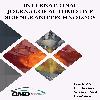Theoretical Fundamentals of Scaled Business Agility and Project Portfolio Management at Automotive Manufacturers
Theoretical Fundamentals of Scaled Business Agility and Project Portfolio Management at Automotive Manufacturers
Business Agility, Scaled Agility, Portfolio Management,
___
- [1] Gnanasambandam C, Palaniappan J, Schneider J. Every com-pany is a software company: Six ‘must dos’ to succeed. In: McKinsey Quarterly. 2023; 1: 92-98.
- [2] Nadella S. The Future of Automotive – Plenum Discussion with Dieter Zetsche (CEO of Mercedes Benz at that time). In: Mobile World Congress. 2019.
- [3] Rigby D, Sutherland J, Noble A. Agile at Scale. In: Harvard Business Review. 2018; 5: 88-96.
- [4] Scheller T. Auf dem Weg zur agilen Organisation. Wie Sie Ihr Unternehmen dynamischer, flexibler und leistungsfähiger ge-stalten. 2017: 20-23.
- [5] Baltes G, Freyth A. Veränderungsintelligenz. Agiler, innovati-ver, unternehmerischer den Wandel unserer Zeit meistern. 2017: 4-8.
- [6] Kalyanakrishnan S. Lean Agile for Project & Portfolio Man-agement Efficiency. In: PM World Journal. 2013; 11: 1-20.
- [7] Layton M. Agile Project Management. 2012: 35.
- [8] Jurecka P. Strategy and Portfolio Management Aspects of Inte-grated Business Planning. In: Central European Business Re-view. 2013; 2: 28-34.
- [9] Schrage B. Project Portfolio Management Can Ensure Best Use of Time and Resources. Management Science. In: Natural Gas & Electricity. 2018; 8: 21-25.
- [10] Chin G. Agile Project Management: How to Succeed in the Face of Changing Projects Requirements. 2006: 174.
- [11] Kompalla A, Studeny M, Bartels A Tigu G. Agile Busi-ness Strategies: How to Adjust to Rapidly Changing Environ-ments? In: Proceedings of the European Conference on Innova-tion & Entrepreneurship. 2016: 414-424.
- [12] Kasperk G, Fluchs S, Drauz R. Geschäftsmodelle entlang der elektromobilen Wertschöpfungskette. In: Elektromobilität: Grundlagen einer Zukunftstechnologie. 2013: 133-180.
- [13] Langenscheidt. Latein-Deutsch Wörterbuch. Agilis. 2023. (https://de.langenscheidt.com/latein-deutsch/agilis).
- [14] Förster K, Wendler R. Theorien und Konzepte zu Agilität in Organisationen. In: Dresdner Beiträge zur Wirtschaftsinfor-matik. 2014; 12: 2-20.
- [15] Duguay C, Landry S, Pasin F. From mass production to flexible/agile production. In: International Journal of Operati-ons & Production Management. 1997; 12: 1183-1195.
- [16] Sambamurthy V, Bharadwaj A, Grover V. Shaping Agili-ty through Digital Options: Reconceptualizing the Role of In-formation Technology in Contemporary Firms. In: Management Information Systems Quarterly. 2003; 2: 245.Graf N, Gramß D, Edelkraut F. Agiles Lernen: Neue Rollen, Kompetenzen und Methoden im Unternehmenskontext. 2017: 34.
- [17] Scheller T. Auf dem Weg zur agilen Organisation. Wie Sie Ihr Unternehmen dynamischer, flexibler und leistungsfähi-ger gestalten. 2017: 20-25, 110, 220.
- [18] Apke L. Understanding the Agile Manifesto: A Brief & Bold Guide to Agile. 2014: 9-20.
- [19] Sutherland J. SCRUM. The Art of Doing Twice the Work in Half the Time. 2014: 12.
- [20] Meyer B. Agile! The Good, the Hype and the Ugly. 2014: 3-8.
- [21] Wolf H, Bleek W-G. Agile Softwareentwicklung. Werte, Konzepte und Methoden. 2008: 16-20.
- [22] LeSS Framework. Overview. 2023. (https://less.works/less/framework/index?preferred_lang=de).
- [23] Scaled Agile Framework. Scrum Master. 2020. (https://www.scaledagileframework.com/scrum-master/).
- [24] Rubin K. Essential Scrum: Umfassendes Scrum-Wissen aus der Praxis. 2012: 35-40.
- [25] Hanser E. Agile Prozesse: Von XP über Scrum bis MAP. 2010: 61-68.
- [26] Pichler R. Scrum. Agiles Projektmanagement erfolgreich einsetzen. 2008: 6%, 72%.
- [27] Gloger B. Scrum. Der Paradigmenwechsel im Projekt – und Produktmanagement – Eine Einführung. In: Informatik-Spektrum. 2010; 33: 195-200.
- [28] Gloger B. Scrum: Produkte zuverlässig und schnell ent-wickeln. 2016: 5-10.
- [29] Chard J, Douglass B. Agile Product Development, IBM Limited Edition. 2015: 35.
- [30] Lang M, Scherber S. Der Weg zum agilen Unternehmen – Wissen für Entscheider: Strategien, Potenziale, Lösungen. 2018: 58-60.
- [31] Böhm J. Erfolgsfaktor Agilität. 2019: 97-99.
- [32] Maximini D. Scrum – Einführung in der Unternehmen-spraxis. Von starren Strukturen zu agilen Kulturen. 2018; 2: 58%.
- [33] Patzak G, Rattay G. Project Management: Guideline for the Management of Projects, Project Portfolios, Programs and Project-oriented Companies. 2011: 15-26, 389-399, 423-435.
- [34] ISO, International Standards Organization: Guidance on project management, ISO 21500. 2012: 3-6. (https://www.iso.org/standard/50003.html).
- [35] Chiu Y. An Introduction to the History of Project Man-agement. From the Earliest Times to A.D.1900. 2010: 1-4.
- [36] Morris P. A Brief History of Project Management. In: The Oxford Handbook of Project Management. 2011: 15-36.
- [37] Project Management Institute. What is Project Manage-ment? 2020 (https://www.pmi.org/about/learn-about-pmi/what-is-project-manage-ment#:~:text=Project%20management%2C%20then%2C%20is%20the,in%20the%20mid%2D20th%20century.).
- [38] Keßler H, Winkelhofer G. Projektmanagement: Leitfa-den zur Steuerung und Führung von Projekten. 1997: 55.
- [39] Javorsky A. Projektmanagement im Automotive Bereich. Der Praxisleitfaden. 2018: 40-45, 139-143,167-178.
- [40] Kerzner H. Project Management. A Systems Approach to Planning, Scheduling, and Controlling. 2013; 11: 366, 1111-1112.
- [41] Wolle B. Grundlagen des Software-Marketing. Von der Softwareentwicklung zum nachhaltigen Markterfolg. 2005: 31-33.
- [42] Hirzel M. Herausforderungen des Projektportfolio-Managements. In: Projektportfolio-Management. Strategisches und operatives Multi-Projektmanagement in der Praxis. 2019: 3-11.
- [43] Doerscher T. Portfolio management sharpens business reaction. In: Industrial Management. 2010; 7/8: 10-13.
- [44] Kunz C. Strategisches Multiprojektmanagement. Kon-zeption, Methoden und Strukturen. 2007; 2: 35.
- [45] Seidl J. Multiprojektmanagement: Übergreifende Steue-rung von Mehrprojektsituationen durch Projektportfolio- und Programmmanagement.2011: 10.
- [46] Bea F, Haas J. Strategisches Management. 2009; 6: 149.
- [47] Hutzschenreuter T. Allgemeine Betriebswirtschaftslehre. Grundlagen mit zahlreichen Praxisbeispielen. 2009; 3: 368.
- [48] Kaplan R, Norton D. Balanced Scorecard. Strategien erfolgreich umsetzen. 1997: 139-142.
- Yayın Aralığı: 4
- Başlangıç: 2016
- Yayıncı: Otomotiv Mühendisleri Derneği
Modelling and fault diagnosis of lithium-ion battery for electric powertrain
Adrien SOLOY, Thomas BARTOLİ, Fatima HAİDAR
Christian MANN, Patrick SİEGFRİED, Alex MİCHEL
Structural Optimization of the Brake Pedal using Artificial Intelligence
Karthikeyan SUBRAMANİAN, Annamalai KANDASWAMY
Gazi Başar KOCABAŞ, Erhan CETİN, Senai YALCİNKAYA, Yusuf ŞAHİN
Bora DEMİRCİ, Uğur DEMİR, Gazi AKGÜN, Alper YILDIRIM, Caner AKUNER
A brief survey on cooperative intelligent transportation systems and applications
Kumaran P, Natarajan S, Sudesh Kumar M P, Mohamed RASHİD, Nithish S
